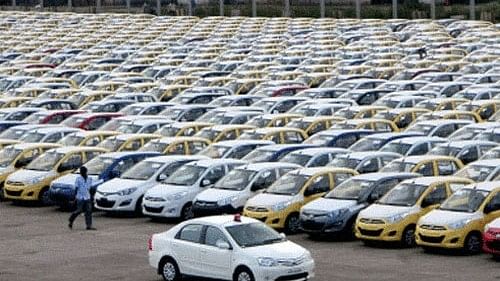
Representative image of vehicles parked.
Credit: PTI File Photo
Karnataka's first Registered Vehicle Scrapping Facility (RVSF) will come up in Bengaluru in the next few weeks, according to the Transport Department.
As per the Registered Vehicle Scrapping Policy in Karnataka 2022, vehicles registered in the state must be scrapped only at authorised RVSFs.
While 64 RVSFs have been opened across the country, Karnataka has none. This will change as the state opens three such facilities this year.
Karnataka's first RVSF is being set up at Vijayapura, near Bengaluru, by Mahindra CERO, a joint venture between central PSU MSTC Ltd and Mahindra Accelo, said C Mallikarjuna, Additional Commissioner of Transport (Enforcement, South).
Credit: DH Graphic
In the beginning, the RVSF will have limited capacity to scrap vehicles and will use only cutters, he added. "Once business improves, the RVSF will get balers that can crush any number of vehicles," he told DH.
The other two RVSFs will be located at Koratagere (Tumakuru district) and Koppal. "We will give them provisional acceptance. The necessary machinery will be set up in the next three months," he added.
The RVSF operator will likely open collection centres in urban areas where owners can deposit their vehicles for scrapping.
Karnataka's policy mandates scrapping all government-owned vehicles that are 15 years or older. Ditto for private vehicles that do not renew their Registration Certificates (RCs) and those that do not get Fitness Certificates (FCs) after 15 years.
Karnataka is, however, going slow on the matter unlike Delhi, which has banned all diesel vehicles that are 10 years or older and petrol vehicles that are 15 years or older.
Contrary to its own policy, the state is yet to scrap overage government-owned vehicles. Furthermore, it has not yet notified tax concessions for scrapping end-of-life private vehicles.
Estimates suggest that the state will have to scrap nearly 15,000 government-owned overage vehicles or about 5,000 per year. In their place, the government will have to buy new vehicles.
"It's a costly exercise. We will need about Rs 1,500 crore per year," Mallikarjuna said.